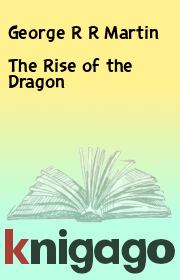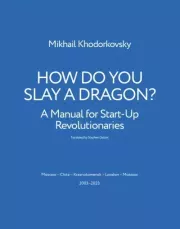Mikhail Khodorkovsky - How Do You Slay A Dragon
Название: | How Do You Slay A Dragon | |
Автор: | Mikhail Khodorkovsky | |
Жанр: | Старинная литература | |
Изадано в серии: | неизвестно | |
Издательство: | неизвестно | |
Год издания: | 2022 | |
ISBN: | неизвестно | |
Отзывы: | Комментировать | |
Рейтинг: | ||
Поделись книгой с друзьями! Помощь сайту: донат на оплату сервера | ||
Краткое содержание книги "How Do You Slay A Dragon"
Right at the start of this book, I had a great surprise. I know Mikhail Khodorkovsky’s story well. I reported for the BBC on his rise to prominence in the YUKOS oil company, his disputes with the newly-elected Russian President, Vladimir Putin, in the first years of the twenty-first century, and his arrest on trumped-up charges in October 2003 and subsequent imprisonment. Four days after his arrest I was due to have a meeting with him in Moscow. Instead, a meeting was arranged with a representative of the Russian Prosecutor’s Office to explain the arrest. The trial hadn’t yet begun. But the outcome was already evident.
К этой книге применимы такие ключевые слова (теги) как: Политика и события
Читаем онлайн "How Do You Slay A Dragon". [Страница - 3]
- 1
- 2
- 3
- 4
- 5
- . . .
- последняя (55) »
I was aware of all of these reasons and weighed them up while rapid preparations were being made for my expulsion from Russia. I understood, too, that without Putin’s goodwill and wish for this to happen, I would never be set free; and also, that his decision upset a lot of people in his circle. Therefore, even though I honestly warned the FSB officer who came to collect me that I did not intend to hide myself away from people and keep silent, I had absolutely no intention of becoming involved in politics simply to seek personal revenge. As far as I was concerned, my account was settled in my personal relationship with Putin: he had sent me down, thus depriving me and my family of ten years of my life; yet he had also saved my life. Looking back on matters now, it’s perfectly clear that had he not acted as he did then, I would have been confined to a life behind bars to the end of my days.
So when I said after my release that I didn’t intend to get involved in politics, I was completely sincere. I never had any desire to be involved in politics just to prove something to Putin, and that’s still the case. Paradoxically, our personal relationship worked out in such a way that I even owe him something. He could have killed me, but he didn’t. He could have left me to rot in jail, but he didn’t. I haven’t forgotten this. I planned to engage in targeted human rights’ and educational activities. It seemed to me that there was sufficient scope to employ my talents and my experience in these fields; and my money could also be very useful. But the more I became involved, the more intensely politics infiltrated into everything I touched. What had happened? What was it that convinced me to turn away from my initial firm resolve not to return to the world of politics?
In order to answer that question, I have to explain what I understand by “political activity”, and what my motivation is to engage in it. In the exact and only possible sense of the word, politics is a struggle for power. Not necessarily power for oneself; it can be a struggle in support of someone else. If the meaning and the aim of political activity is not for power, then it’s not politics. It's fake. Or else the person making such a statement is simply not being honest with themselves and those around them.
People fight for power for two reasons. For some, having power is an end in itself. For others, power is an instrument to obtain other aims. Putting it simply, you can divide politicians into pragmatists, who need nothing more than power itself; and ideologues, for whom achieving power is simply the start of a process. These divisions are, of course, relative and not absolute, but it is useful to bear them in mind.
I was never interested in the concept of power as an end in itself; or as an attribute of the alpha-male; or as the possibility to dominate and enjoy one’s inflated position in the social hierarchy. I’ve been at the very top of society; and at the very bottom, too. I have long understood that formal power, there for all to see, is worth very little. And that real power, that’s often hidden from public view, bears no relation to the politician’s public position. For reasons that will be obvious, I was never interested in using politics as a way to get rich. I was and remained sufficiently wealthy not to have to think about where my daily bread was coming from, and in any case no one can ever earn all the money in the world.
But this wasn’t the main point. I’ve always been very wary – and remain so – of people for whom politics is an end in itself. The problem is that such people have no convictions – nor can they have. Convictions would have made them vulnerable, and made it difficult for them to achieve their goals. In general, other things being equal, it’s easier for an unprincipled person to come to power, as they are unencumbered by any considerations. Such a person can at one moment be “in favour of Soviet power”, and the next moment against; and in either situation they usually win. When there are too many politicians like this, society tumbles into a long period of crises.
Politicians who have convictions are a different matter, although here, too, nothing is simple. If fanatics come to power who hold ideas loaded with hatred for certain groups of people, then they become a threat not only to their own society but to mankind as a whole. Nevertheless, the world would remain stubbornly patriarchal if we didn’t have people in power who hold convictions that express the desire to change society. So the issue as to whether or not I should be involved in politics always brought me back to the question as to whether or not I held worthy convictions for which it made sense for me to go into politics; in other words, to fight for power. Not for my own benefit, but for the benefit of those forces which my convictions supported.
At the time that I was released from prison I didn’t see any particular reason as to why I should become involved in politics in Russia. I held the same general democratic opinions that were supported by hundreds of thousands of other Russians with liberal-minded views. Naturally, I agreed with virtually nothing in the political course that Putin was pursuing, but I wasn’t unique in that. I could express my convictions simply by supporting those whose opinions were close to mine, and this is what I did, even when I was in jail. There was absolutely no need for me to get involved in politics to do this. I didn’t think that I could add anything substantially new to what others were already saying and doing. However, the situation changed shortly after my release.
Literally two months after I was forced to leave Russia against my will, the country became a very different place. Or, to be more precise, it went back to being what it had been before Mikhail Gorbachev introduced perestroika. It was as if the coup plotters of August 1991 had been resurrected and had finally decided to create an alternative version of history. The unsuccessful attempts to crush the revolution in Ukraine, which were followed by the seizure of Crimea by Russia, and which in turn was accompanied by the igniting of a war in the Donbas: all of these events turned everything in Russia on its head. In the space of just a few months, politically Russia was thrown back decades. The first – and most important – reset had taken place. Putin and his circle wiped away everything that my generation had achieved when we had supported Gorbachev and Yeltsin’s attempts to change Russia. This went way beyond my personal conflict with Putin. Now we were talking about a fundamental difference in our views on the fate of Russia, its past, its present and its future. It was this that motivated me to become involved in politics, in a way that I hadn’t intended to, neither when I was in prison nor at the time of my release. It led me to a very simple solution: I had to defend the beliefs and ideals of my generation of revolutionaries. To make it impossible for Russia ever again to give up its future by turning back to its past and falling into the same rut from which, through enormous efforts, we had managed to drag it out at the end of the 1980s.
But how can we do this? For the majority of those who share my views the answer to this question sounded (and continues to sound) fairly straightforward: remove Putin and his clique from power. It sounds tempting, of course; but in
--">- 1
- 2
- 3
- 4
- 5
- . . .
- последняя (55) »
Книги схожие с «How Do You Slay A Dragon» по жанру, серии, автору или названию:
 |
| George R R Martin - The Rise of the Dragon Жанр: Старинная литература Год издания: 101 |
 |
| Mikhail Khodorkovsky - HOW DO YOU SLAY A DRAGON? Жанр: Старинная литература Год издания: 2022 |


